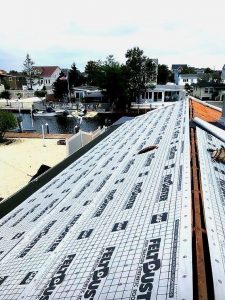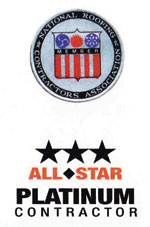Synthetic Roof Underlayment Versus Asphalt
 What is underlayment? Underlayment acts as a protective barrier between the roof deck and roofing materials (such as metal or shingles). Underlayment also serves as protection against water damage and extreme weather damage. There are several different types of underlayment, however, the two most common are asphalt-saturated felt and non-bitumen synthetic underlayment. Asphalt-saturated felt is comprised of a base, made of organic materials such as wood cellulose, and saturated with asphalt. Non-bitumen synthetic underlayment is comprised of synthetic materials, such as fiberglass or polyester as well as polyethylene or polypropylene. Both asphalt-saturated felt and non-bitumen synthetic underlayment have advantages and disadvantages, which should all be considered before the material is chosen for any specific roofing needs.
What is underlayment? Underlayment acts as a protective barrier between the roof deck and roofing materials (such as metal or shingles). Underlayment also serves as protection against water damage and extreme weather damage. There are several different types of underlayment, however, the two most common are asphalt-saturated felt and non-bitumen synthetic underlayment. Asphalt-saturated felt is comprised of a base, made of organic materials such as wood cellulose, and saturated with asphalt. Non-bitumen synthetic underlayment is comprised of synthetic materials, such as fiberglass or polyester as well as polyethylene or polypropylene. Both asphalt-saturated felt and non-bitumen synthetic underlayment have advantages and disadvantages, which should all be considered before the material is chosen for any specific roofing needs.
Synthetic Roof Underlayment
Synthetic roof underlayment is a newer option compared to asphalt-saturated felt. It has been around since the early 2000s and has become more popular in recent years. Synthetic underlayment has plenty of positive attributes such as longevity, durability, temperature tolerance, heat retention, and more. However, the major drawback with synthetic underlayment is the price, which can sometimes reach prices five times higher than traditional felt rolls.
Advantages of Synthetic
- Longevity – There are two factors that contribute to synthetic underlayment’s longevity. The most obvious is that synthetic underlayment can last longer than traditional felt. A synthetic underlayment is guaranteed to last as long as most roofing systems, including metal, for 40+ years. The second factor to consider is that synthetic underlayment can last 180+ days (depending on brand) without any roofing material on top. This is a positive just in case a project is delayed before the shingles or other roofing materials can be added atop the underlayment.
- Durability – Synthetic underlayment has proven its strength compared to traditional felt. Then thermoplastic polymers in synthetic underlayment help to prevent tearing. Tests done by Owens Corning show that synthetic underlayment can be up to 12x stronger than traditional felt.
- Temperature Tolerance – Synthetic Underlayment has a high heat tolerance and will not wrinkle or tear in the sun as traditional felt does. Depending on the brand, some synthetics can withstand heat up to 260 degrees Fahrenheit. They also typically come in lighter colors and retain less heat, meaning they are easier to touch.
- Size – Synthetic underlayment typically comes in larger rolls than traditional felt. A standard synthetic roll will be approximately 1,000 sq. ft per roll while traditional felt rolls tend to range between 200 sq. ft. and 400 sq. ft. However, despite coming with more product, synthetic typically weighs much less. Per roll, synthetic averages 2 to 4 pounds per square, while traditional asphalt averages 15 to 30 pounds per square.
- Warrantied – The majority of synthetic underlayment products come with a warranty, which is very helpful if there is ever any damage. Due to the longevity and durability of the product being so high, most companies will give synthetic underlayment a much longer warranty than traditional asphalt felt, sometimes going up to 50 years.
- Walkability – Walkability is extremely important to consider when deciding on a product. Most synthetic underlayment products have a built-in slip-resistant surface, making it easier to walk on without having to worry about injuries.
- Recyclability – The substances that synthetic underlayment is made out of – polyethylene and polypropylene – are both recyclable, meaning that once the roof needs to be replaced or if there is any product left over, it can all be recycled.
Disadvantages of Synthetic
- Price – The major disadvantage to take note of is the price of synthetic underlayment. As previously mentioned, synthetic underlayment can reach prices that are five times higher than traditional asphalt felt, making it an unrealistic option for some people with lower budgets. However, it is important to remember that since the rolls come with more product and last much longer, the long-term investment is definitely worth it.
- Asphalt-Saturated Felt Underlayment – Asphalt-saturated felt has been the most popular option for roofers for decades. The base layer is typically made of either cellulose, polyester, or bitumen. The base layer is then saturated (or soaked) in asphalt to make the product water-resistant. Although asphalt-saturated felt was the most popular option for so long, due to it being cheaper. However, many roofers are now choosing synthetic materials due to asphalt-saturated having many disadvantages, such as less longevity, durability, and less material per roll.
Felt Underlayment Advantages
- Price – Asphalt-Saturated felt underlayment is a much cheaper option than synthetic. If a family or building owner is on a budget, that makes asphalt-saturated felt a much better option.
- Water Resistance – Due to the base layer being saturated in asphalt, this underlayment is water resistant and will prevent leaks and water damage.
- Availability – Due to the fact that asphalt-saturated felt was the more popular option for so long, many home improvement stores still carry it, making it easy to get.
Felt Underlayment Disadvantages
- Reduced Longevity – One of the major perks of synthetic underlayment is how long it lasts. Some companies guarantee that their synthetic product will last 40+ years and it comes with warranties for up to 50 years. Asphalt-saturated felt underlayment, however, typically only lasts 15 to 20 years and thus, is not warrantied for as long. If exposed for an extended period of time, felt underlayment is subject to tears and other damage.
- Low-Temperature Tolerance – Unlike synthetic underlayment, felt underlayment does not perform as well in extreme temperatures. If exposed to high heat, felt underlayment can dry out, crack, or prematurely degrade.
- Weight – As previously mentioned, felt underlayment can weigh up to 30 pounds per square, making it more difficult to carry. Also, since it comes with less product per square, a larger number of rolls will be needed for the same size project.





























